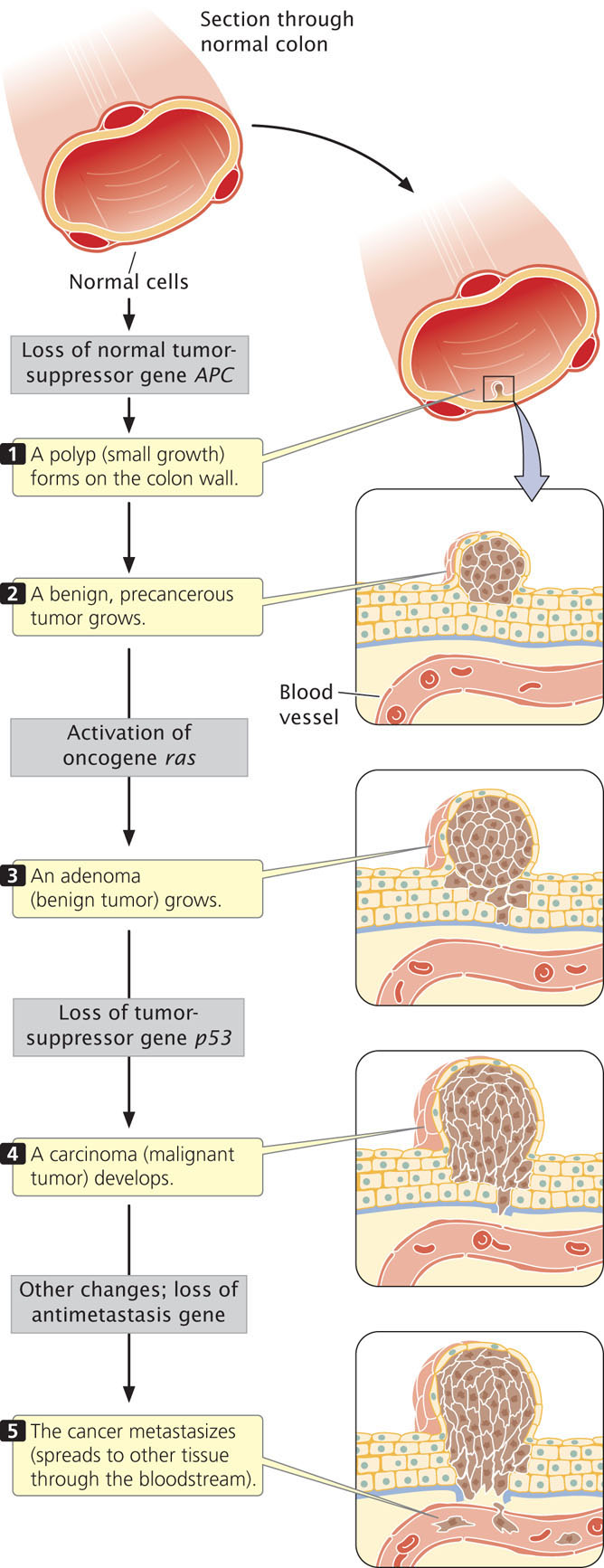23.4 Colorectal Cancer Arises Through the Sequential Mutation of a Number of Genes
Colorectal cancer is an excellent example of how cancer often arises through the accumulation of successive genetic defects. Mutations that contribute to colorectal cancer have been extensively studied.
Colorectal cancer arises in the cells lining the colon and rectum. More than 143,000 new cases of colorectal cancer are diagnosed in the United States each year, where this cancer is responsible for more than 51,000 deaths annually. If detected early, colorectal cancer can be treated successfully; consequently, there has been much interest in identifying the molecular events responsible for the initial stages of this cancer.
Colorectal cancer is thought to originate as benign tumors called adenomatous polyps (Figure 23.10). Initially, these polyps are microscopic but, in time, they enlarge and the cells of the polyp acquire the abnormal characteristics of cancer cells. In the later stages of the disease, the tumor may invade the muscle layer surrounding the gut and metastasize. The progression of the disease is slow; from 10 to 35 years may be required for a benign tumor to develop into a malignant tumor.

676
Most cases of colorectal cancer are sporadic, developing in people with no family history of the disease, but a few families display a clear genetic predisposition to it. In one form of hereditary colon cancer, known as familial adenomatous polyposis coli, hundreds or thousands of polyps develop in the colon and rectum; if these polyps are not removed, one or more almost invariably become malignant.
Because polyps and tumors of the colon and rectum can be easily observed and removed with a colonoscope (a fiber-optic instrument used to view the interior of the rectum and colon), much is known about the progression of colorectal cancer, and some of the genes responsible for its clonal evolution have been identified. Mutations in these genes are responsible for the different steps of colorectal-cancer progression. Among the earliest steps is a mutation that inactivates the APC gene, which increases the rate of cell division, leading to polyp formation (see Figure 23.10). A person with familial adenomatous polyposis coli inherits one defective copy of the APC gene, and defects in this gene are associated with the numerous polyps that appear in those who have this disorder. Mutations in APC are also found in the polyps that develop in people who do not have adenomatous polyposis coli.
Mutations of the ras oncogene usually occur later, in larger polyps consisting of cells that have acquired some genetic mutations. As discussed earlier in this chapter, the normal ras proto-oncogene is a key player in a signal-transduction pathway that relays signals from growth factors to the nucleus, where the signal stimulates cell division. When ras is mutated, the protein that it encodes continually relays a stimulatory signal for cell division even when growth factor is absent.
Mutations in p53 and other genes appear still later in tumor progression; these mutations are rare in polyps but common in malignant cells. About 75% of colorectal cancers have mutations in tumor-suppressor gene p53. Because p53 prevents the replication of cells with genetic damage and controls proper chromosome segregation, mutations in p53 can allow a cell to rapidly acquire further gene and chromosome mutations, which then contribute to further proliferation and invasion into surrounding tissues.
The sequence of steps just outlined is not the only route to colorectal cancer, and the mutations need not occur in the order presented here. However, this sequence is a common pathway by which colon and rectal cells become cancerous.